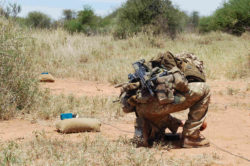Top Class Actions’s website and social media posts use affiliate links. If you make a purchase using such links, we may receive a commission, but it will not result in any additional charges to you. Please review our Affiliate Link Disclosure for more information.

Reportedly, these banks aided Iran, and these funds were then distributed to various terrorist organizations who used them in the Iraq and Afghanistan wars. These weapons included IEDs and EFPs, so if you suffered an IED injury or similar during the Iraq or Afghanistan wars, your injuries could have been connected to this terrorist activity.
These actions likely violated the United States Anti-Terrorism Act, so people who were hurt by an IED injury or whose family embers were injured or killed as a result of terrorist involvement in the Iraq and Afghanistan wars may have a legal claim.
Numerous foreign banks have admitted to conspiring with Iran during the Iraq and Afghanistan wars. Some of these banks have reached settlements over the issue. However, some banks aren’t being further prosecuted, and people affected by the terrorists could help fight back by filing an IED lawsuit.
The banks that reportedly sponsored terrorism by providing funding to terrorist groups are located around the world. The companies that reportedly funded state-sponsored terrorism in the Iraq and Afghanistan wars may include:
- Arab Bank
- Bank of China
- Bank Saderat Iran
- Bank Saderat Plc
- Barclays Plc.
- BNP Paribas
- Commerzbank A.G.
- Crédit Lyonnais
- Credit Suisse Group A.G.
- HSBC Holdings Plc.
- Natwest
- Royal Bank of Scotland Plc.
- Standard Chartered
Experts report that most of the funds provided by these banks went toward funding dangerous explosive devices. These devices are known as improvised explosive devices (IEDs) and explosively formed penetrators (EFPs). These weapons are highly dangerous because they are easy to conceal, so both people on foot and in vehicles may come into contact with them and not realize it until it’s too late.
Unfortunately, numbers of IED deaths have continued in Afghanistan, according to Foreign Policy. The British newspaper The Telegraph reported in 2006 that these weapons were being made in large quantities in Iranian factories.
In 2011, Adm. Mike Mullen, who was serving as Chairman of the Joint Chiefs of Staff, then confirmed that these weapons were then being sent to Iraq to support Shiite extremists. He said that top Iranian government officials were aware of these actions.
Congress put sanctions in place that were designed to prevent Iran from engaging in terrorist acts or supporting terrorism. These sanctions were effective in restricting a large amount of Iran’s ability to obtain the funding they would need to create and reply weapons. However, Iran got around these sanctions in some ways by finding banks that would sponsor them in exchange for profits.
IED Injury Lawsuits
People who suffered an IED injury or whose family members suffered an IED injury aren’t without recourse. The United States Anti-Terrorism Act allows
Any national of the United States injured in his or her person, property, or business by reason of an act of international terrorism, or his or her estate, survivors, or heirs, may sue therefor in any appropriate district court of the United States and shall recover threefold the damages he or she sustains and the cost of the suit, including attorney’s fees. (18 U.S. Code § 2333)
If you suffered an IED injury, filing an IED injury lawsuit can help you gain compensation that can help you pay for medical costs and other expenses related to your injuries.
If you or a loved one was injured or killed by an IED or EFP while fighting in the Iraq or Afghanistan wars, legal recourse is available. Get help now by filling out the form on this page for a FREE case evaluation.
The attorneys who work with Top Class Actions will contact you if you qualify to let you know if an individual lawsuit or anti-terrorist class action lawsuit is best for you. (In general, anti-terrorist lawsuits are filed individually by each plaintiff and are not class actions.) After you fill out the form, the attorneys who work with Top Class Actions will contact you if you qualify to let you know if an individual lawsuit or class action lawsuit is best for you. Hurry — statutes of limitations may apply.
ATTORNEY ADVERTISING
Top Class Actions is a Proud Member of the American Bar Association
LEGAL INFORMATION IS NOT LEGAL ADVICE
Top Class Actions Legal Statement
©2008 – 2024 Top Class Actions® LLC
Various Trademarks held by their respective owners
This website is not intended for viewing or usage by European Union citizens.
Get Help – It’s Free
Join a Free Iranian IED, EFP Lawsuit Investigation
If you qualify, an attorney will contact you to discuss the details of your potential case at no charge to you.
PLEASE NOTE: If you want to participate in this investigation, it is imperative that you reply to the law firm if they call or email you. Failing to do so may result in you not getting signed up as a client or getting you dropped as a client.
Email any problems with this form to questions@topclassactions.com.
Oops! We could not locate your form.












